Classroom Resource Library
Search Resources
Filters:
“I Have a Dream” Mobiles
Celebrate Dr. Martin Luther King, Jr.'s historic "I Have a Dream" speech with a mobile that inspires you to think about your own dreams.
10.1 Primary Source: First Amendment
This activity is part of Module 10: The First Amendment from the Constitution 101 Curriculum
13th Amendment, Congressional Copy
This handwritten congressional copy of the amendment that banned slavery is signed by President Lincoln and others.
2017 Civic Holiday Calendar: Famous Cases
The 2017 calendar explores turning points in American history with fifteen landmark Supreme Court cases.
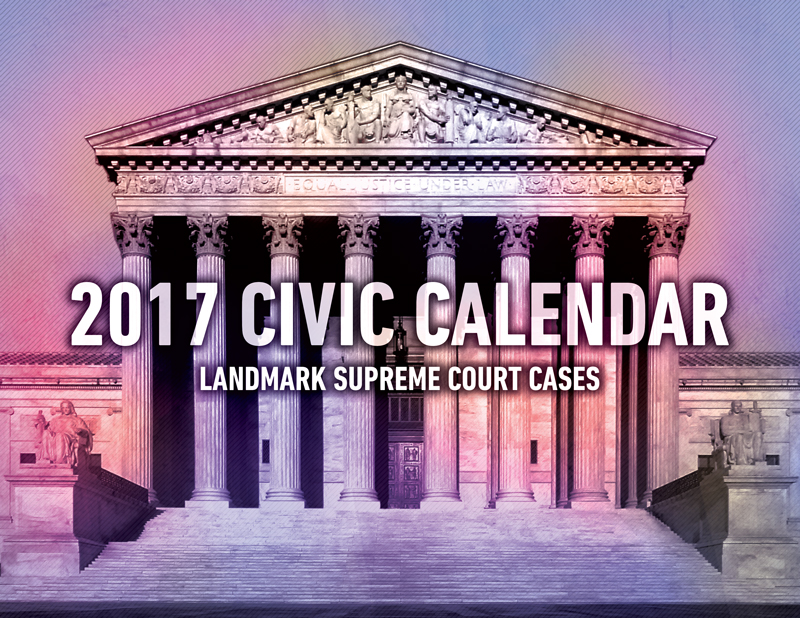
2018 Civic Holiday Calendar: 14th Amendment
To commemorate the 150th anniversary of the 14th Amendment, the Center's 2018 calendar explores its history and legacy.
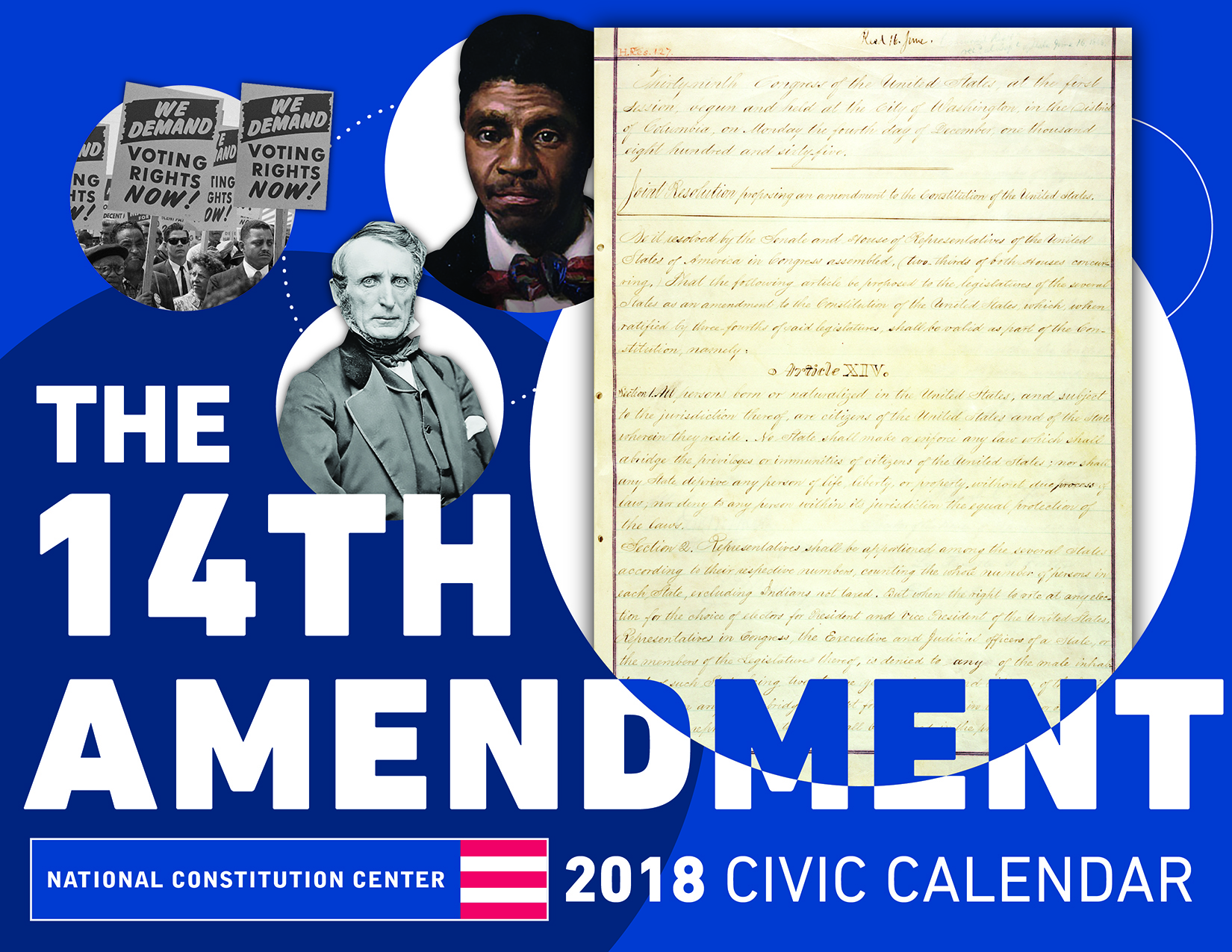
2019 Civic Holiday Calendar: The First Amendment
The 2019 Civic Calendar from the National Constitution Center not only highlights civic holidays throughout the year, but will also focus on historical events dealing with the First Amendment.
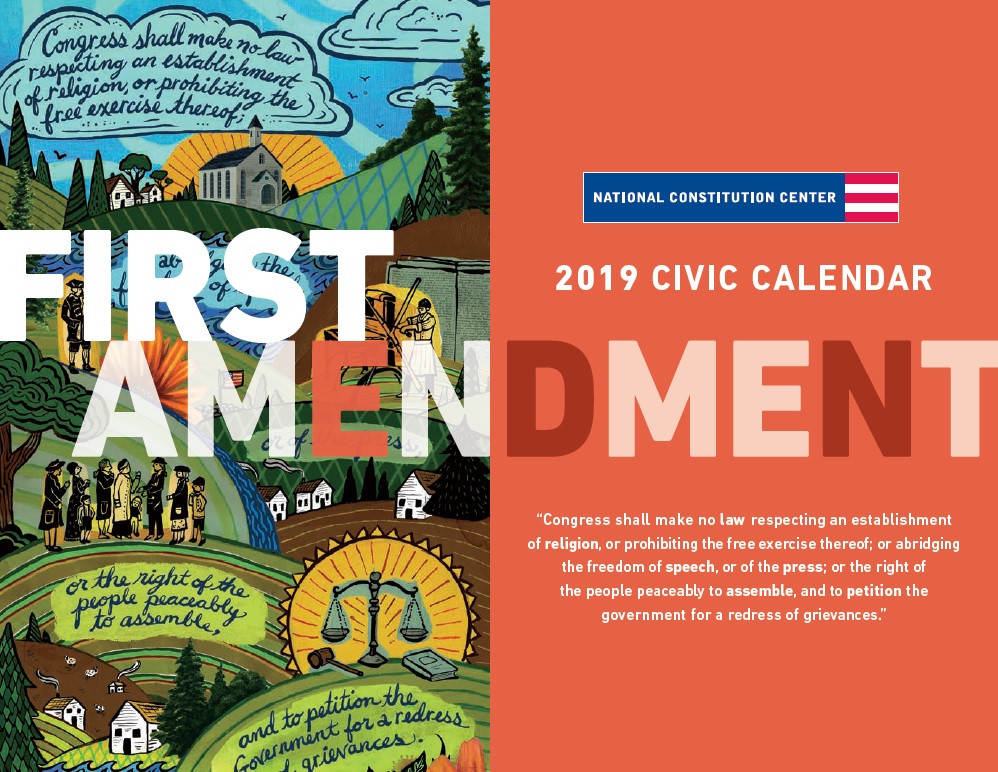
2022/2023 Civic Calendar
The National Constitution Center’s 2022-2023 Civic Calendar explores the 27 Amendments in 12 Months!
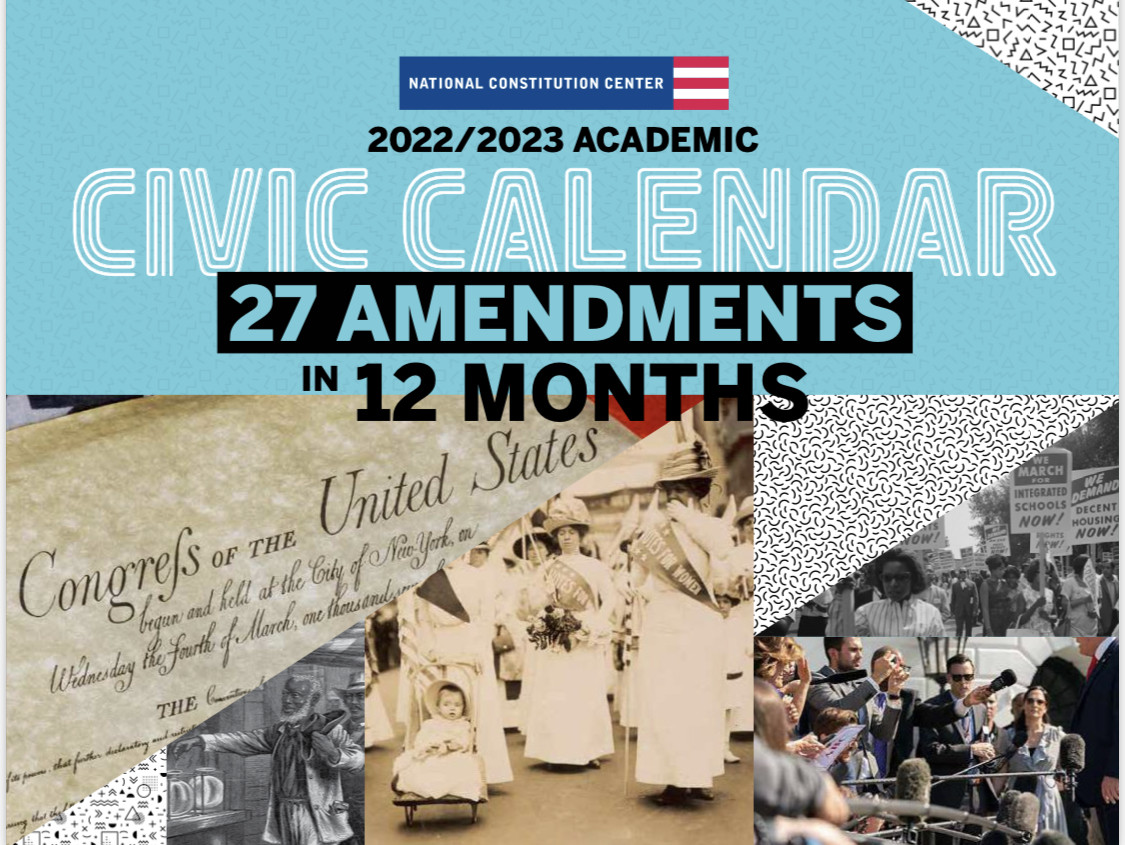
2023/2024 Civic Calendar
The National Constitution Center’s 2023-2024 Civic Calendar explores the Civil Rights Movement.
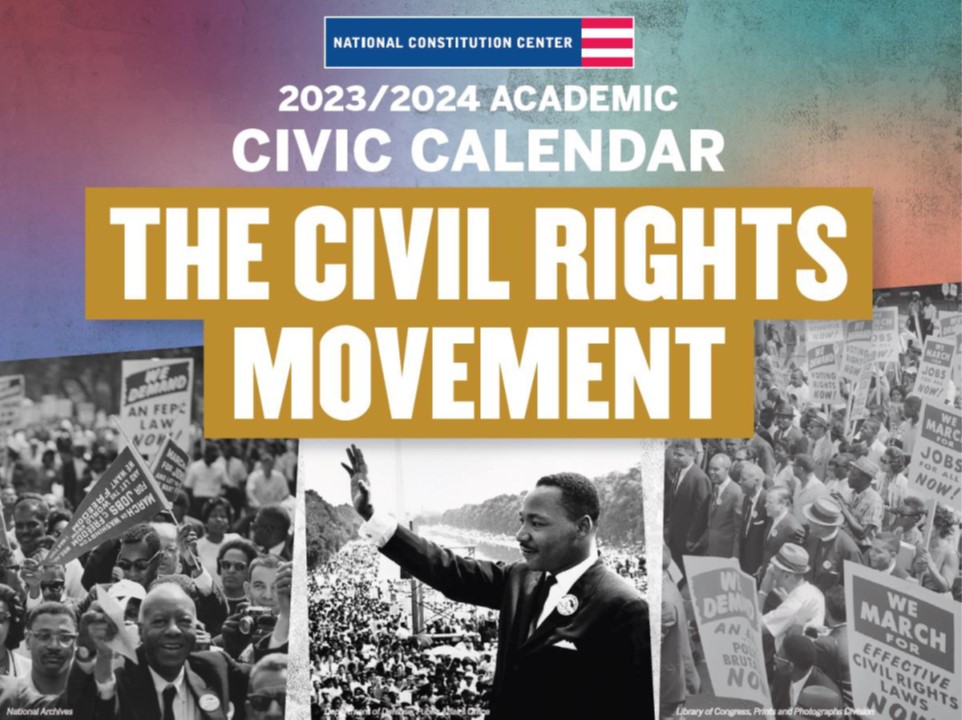
2024/2025 Civic Calendar
The National Constitution Center’s 2024-2025 Civic Calendar explores the history of elections and voting rights in the United States.
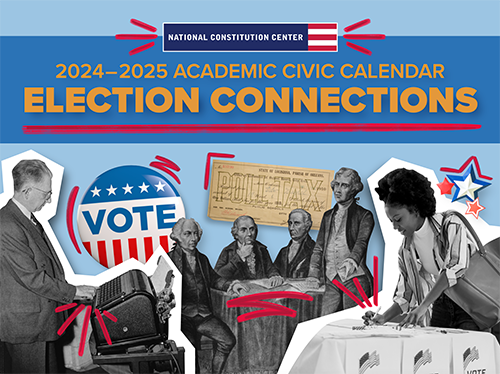
3.7 Printable Knowledge Check: The Road to the Convention
This activity is part of Module 3: Road to the Convention from the Constitution 101 Curriculum.
A Twenty-First Century Framework for Digital Privacy
How can we strike the right balance between security and privacy in the digital age? What constitutional and statutory protections should there be for data stored through cloud-based services, and under what circumstances and with what constraints should the government get access to it?
Abraham Lincoln’s Crossroads
In this online game, learn about Lincoln’s leadership by exploring the political choices he made.
Amendment Cootie Catchers
This clever twist on the classic cootie catcher tests your knowledge of the first 10 amendments.
American Flag Pinwheels
Show your patriotic pride with this festive stars-and-stripes-covered pinwheel.
Art of the American Soldier: Stories from the Soldiers
Students will deepen their appreciation of war art through watching and listening to veteran war experiences.
Articles of Confederation
The first charter, or constitution, adopted by the 13 states following the American Revolution.
Ben Franklin Kites
Celebrate one of America's most famous Founding Fathers with a craft inspired by his kite experiment.
Bill of Rights
The first ten Amendments to the Constitution form the Bill of Rights.
Bill of Rights
Students learn about the specific rights and freedoms protected by the Bill of Rights, one of our nation's most important documents.
Bill of Rights Bingo
Get more familiar with the Bill of Rights with this simple bingo game.
Birthright Citizenship
The question of who qualifies for U.S. citizenship at birth has been a topic of debate for years, but it has gained renewed attention recently. Birthright citizenship means that people born in the United States automatically become U.S. citizens. This approach is rooted in the Citizenship Clause of the 14th Amendment. However, some argue that this approach should be reconsidered, especially regarding children born to noncitizen parents.
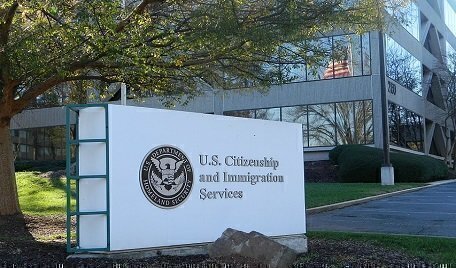
Breaking Barriers
Students will get a look at how African-American individuals have broken barriers to racial integration in the United States.
Brown v. Board of Education Word Puzzle
Learn about a landmark Supreme Court ruling with this word puzzle.
Centuries of Citizenship: A Constitutional Timeline
Centuries of Citizenship: A Constitutional Timeline is an online experience highlighting some of the key dates and events that mark more than 200 years of our constitutional history.
Cipher Wheel
Use this cipher wheel to create your own secret code!
Columbia University Student Deportation Case
Recently, Mahmoud Khalil, who immigrated to the United States on a student visa and later obtained a Permanent Resident Card (sometimes called a “Green Card”), was detained by federal immigration officers and faces possible deportation after the State Department revoked his legal permanent resident status purportedly because of his participation in public pro-Palestine protests. The current case involving Khalil, a student at Columbia University in New York, may center on a law from the 1950s, and how courts interpret it.
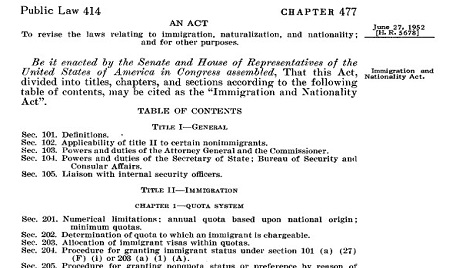
Constitution Hall Pass: Freedom Of Expression From Constitution Day 2011
Learn about how the Constitution protects our rights and the freedom to express ourselves—out loud!
Constitution Hall Pass: Dollars and Sense: Tax Day
Learn how the Constitution was amended to allow the federal government to impose an income tax, and learn where those tax dollars go today.
Constitution Hall Pass: Dr. Martin Luther King, Jr.: A Legacy of Service
In this episode, we look at Dr. King’s legacy of service—and we’ll even learn about ways that you can serve your community.
Constitution Hall Pass: Everything’s Gone Green: The Story of Earth Day
In this popular episode, we explore the history of the environmental movement in the United States and the origins of the holiday we know as Earth Day.
Constitution Hall Pass: History of Thanksgiving
Discover the real story of the first Thanksgiving and how the day became a national holiday during the Civil War.
Constitution Hall Pass: The Bill of Rights
Explore the compelling story of our Constitution’s first ten amendments.
Constitution Hall Pass: The Presidency (Constitution Day 2012)
Just in time for the 2012 election, this engaging, interactive lesson traces the history of the American presidency.
Constitution Word Puzzle
Learn about basic terms from the Constitution with this word puzzle.
Constitutional Exchanges Introduction Thinking Sheet
As you read, interpret, and cite the documents in the Interactive Constitution, it is important to think about how the Constitution expands or limits the power of government. This is how Constitutional Scholars read, interpret, and cite the Constitution. But how can you do this? Here are some tips to help.
Declaration of Independence
The Declaration of Independence was written in 1776 by Thomas Jefferson.
Design Your Own Dollar Bill
This activity is perfect for commemorating Tax Day.
Design Your Own Flag
As you learn about the symbolism and importance of our America's flag, you can design your own flag.
Elon Musk, DOGE, and the Appointments Clause
Elon Musk and the newly created Department of Government Efficiency (DOGE) have been freezing federal spending and laying off federal employees, raising constitutional questions about the scope of its power. At the heart of the debate is the Appointments Clause in Article II of the Constitution.

Emancipation Proclamation, Leland-Boker Edition, 1864
Enacted in 1862, this edition of the Emancipation Proclamation was signed by President Abraham Lincoln.
Executive Orders
In recent weeks, President Donald Trump has issued a series of executive orders addressing immigration, foreign affairs, federal spending, and more. But what exactly are executive orders, and how do they fit into our constitutional system?
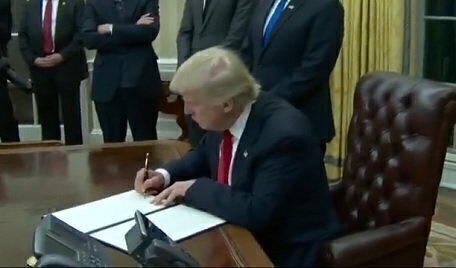
Filibuster or Speech?
On April 1, 2025, Senator Cory Booker of New Jersey set a record for making the longest speaking appearance on the Senate floor. But Booker’s effort did not likely qualify as a “filibuster,” one of the chamber’s unique traditions of attempting to block or delay a vote by not allowing debate on it to end.

First Amendment Exhibit Guide
Download our First Amendment Exhibit Guide
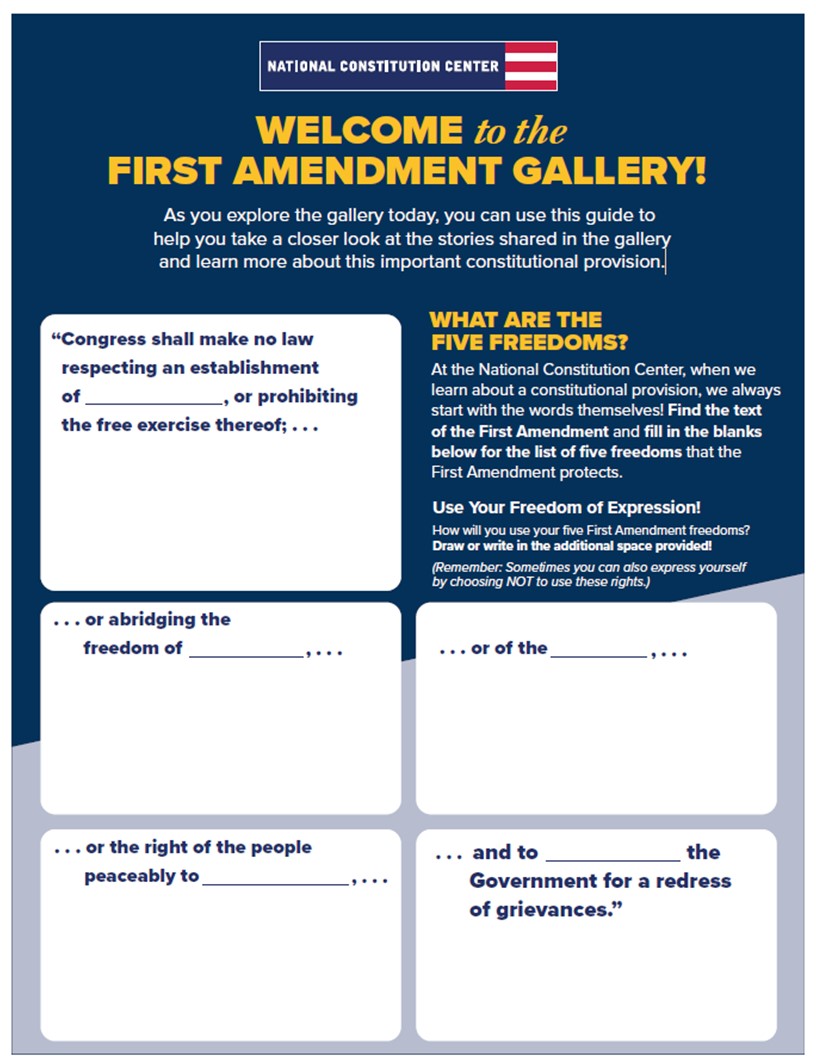
First Amendment Series: Jimmy Kimmel, ABC, and the First Amendment
What does the Constitution say about free speech on the airwaves?
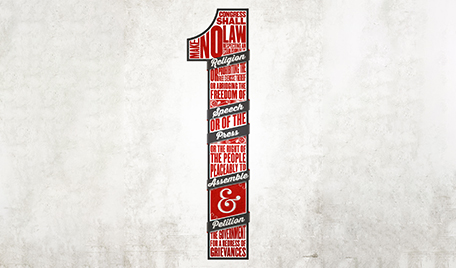
First Amendment: Speech
This lesson encourages students to examine their own assumptions and to deepen their understanding of current accepted interpretations of speech rights under the First Amendment.
Founding Fathers Word Puzzle
Learn about the signers of the U.S. Constitution with this word puzzle.
Future of Birthright Citizenship: SCOTUS Preview
On May 15, the Supreme Court will hear oral arguments in a case challenging the constitutionality of an executive order from President Donald Trump, which seeks to end birthright citizenship for the children of undocumented immigrants. While this case raises big constitutional questions about the scope of the 14th Amendment’s citizenship clause, the Court will likely focus on a narrower procedural issue: whether lower courts can block a policy nationwide.
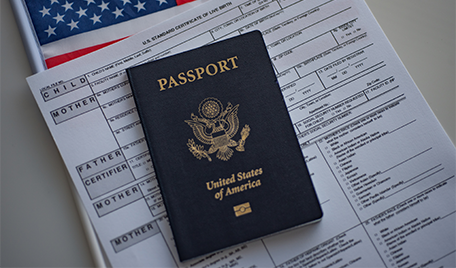
Getting to Know the Founding Fathers
Learn more about the signers of the Constitution with these Founding Fathers biographies.
Getting to Know the Founding Fathers
Learn more about the delegates of the Constitutional Convention with these Founding Fathers biographies.
Habeas Corpus, Past and Present
There’s been renewed talk in Washington, D.C., about suspending habeas corpus, the constitutional right that protects people from being detained without justification. On May 9, 2025, White House Deputy Chief of Staff Stephen Miller suggested the Trump administration is considering suspending this right in the context of immigration enforcement, arguing the Constitution allows it in times of invasion.
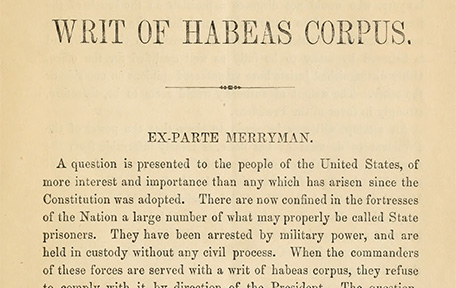
Intellectual Inspirations of the Constitution and Its Impact Today
How did Enlightenment and classical thinkers shape the Constitution? How do their ideas still guide American government today?
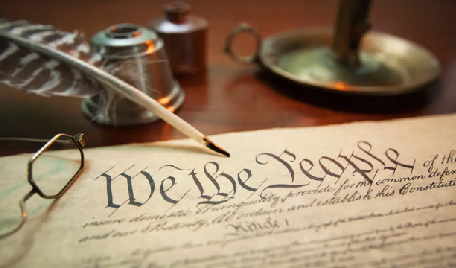
INTERACTIVE CONSTITUTION: SECOND AMENDMENT
This lesson introduces students to different viewpoints and debates surrounding the 2nd Amendment by using the National Constitution Center’s Interactive Constitution. Students will build understanding of the resources and methods used by justices on the Supreme Court and Constitutional scholars when analyzing and forming opinions about articles, sections, and clauses of the Constitution.
Investigating the Departments of the Executive Branch
In this lesson, students learn about the role of bureaucracy in U.S. government.
Lady Liberty Hats
Celebrate freedom by fashioning your own Lady Liberty hat.
Landmark Court Case: Scott v. Sandford
Using video clips from the Landmark Supreme Court Cases series, a partnership between C-SPAN and the National Constitution Center, students will research and role-play to better understand the legal, social, and economic factors relating to--and implications of--the majority and dissenting opinions in this infamous case.
Landmark Supreme Court Cases: The Slaughter House Cases
Using video clips from the Landmark Supreme Court Cases series, a partnership between C-SPAN and the National Constitution Center, students will investigate the Supreme Court's interpretation of the 14th Amendment in the years after its ratification.
Liberty Bell Sun Catchers
Make a dazzling sun catcher to commemorate the Liberty Bell and the constitutional ideals it symbolizes.
Lincoln: The Constitution and the Civil War
In this lesson, students will analyze the political and constitutional issues that faced President Abraham Lincoln during the Civil War.
Living News Classroom Teaching Materials
These Classroom Teaching Materials are designed to be used in conjunction with the Living News theatrical performance at the National Constitution Center or stand alone.
Living News Classroom Tool Kit
This lesson is designed to be used in conjunction with the Living News theatrical performance at the National Constitution Center.
Magna Carta
The Magna Carta, or “Great Charter,” established the rule of law.
Mayflower Compact
This document was an agreement drafted by the settlers of the first New England colony.
Native Nations: From Ancient Cities to Today
How have constitutional principles and federal law influenced the sovereignty and citizenship of Native nations in the 19th and 20th centuries?
Patriotic Wreaths
Decorate and customize a wreath for Independence Day, Flag Day, Memorial Day, or Veterans Day.
Perseverance and the First Amendment
In this lesson, students will analyze how people throughout history have exercised their First Amendment rights to express their opinions.
Perspectives on the Constitution: A Republic, If You Can Keep It
A perspective by Richard R. Beeman, professor of history at the University of Pennsylvania.
Perspectives on the Constitution: Constitutions Around the World
A perspective by Kim Lane Scheppele, professor of law, political science, and sociology at the University of Pennsylvania.
Perspectives on the Constitution: Understanding Our Constitution
A perspective by Akhil Reed Amar, professor of law at Yale University Law School, and Douglas W. Kmiec, dean of Catholic University Law School.
Preamble Scramble
Have fun getting to know the phrases of the Preamble while you unscramble the puzzle.
Presidential Term Limits
Recently, a member of the House of Representatives proposed changing the Constitution to allow current President Donald Trump the option of running for a third term as president. Constitutional amendment proposals are common during congressional terms, but few ever make it to the states as proposed amendments.
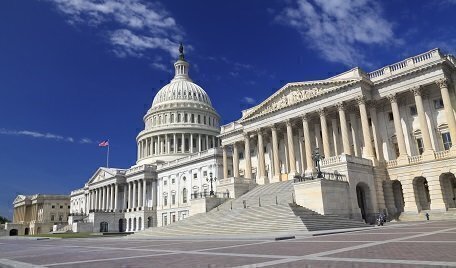
Press Cases After World War II
How has the Supreme Court defined the scope of press freedom in the post-World War II era?
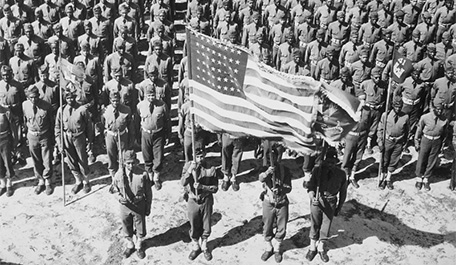
Press Censorship After World War I
How does wartime test the limits of First Amendment freedoms?
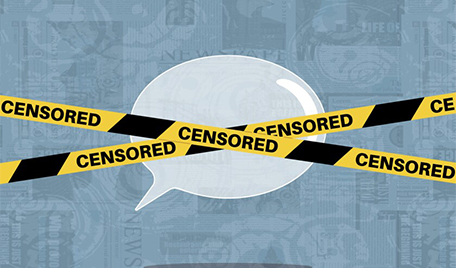
Proposed Voter Registration Changes
Presidential actions and proposed legislation in recent weeks could reshape how people register to vote for federal elections. In March, President Donald Trump issued an executive order requiring proof of citizenship for voters, while also aiming to end the practice in states of counting mail-in ballots received after Election Day.

Respecting Freedom of Speech
In this lesson, students will consider how respect and freedom of expression intersect and their role in maintaining a free society.
Rule of Law: High School Level
This two-day lesson uses historical quotations to help students develop understandings of conceptions of the Rule of Law, then, through small group work and class-wide collaboration analyzing Supreme Court cases, students will reflect on how their understandings of Rule of Law relate to the Constitution, the judicial system, and their daily lives.
Scope of Executive Power: Part 1
In recent weeks, there has been renewed debate over the scope of executive power and the extent of the president’s authority under the Constitution. Some argue that the president has broad control over the executive branch, while others contend that this power is more limited. But what does the Constitution actually say about executive power, and how has this question been interpreted over time?
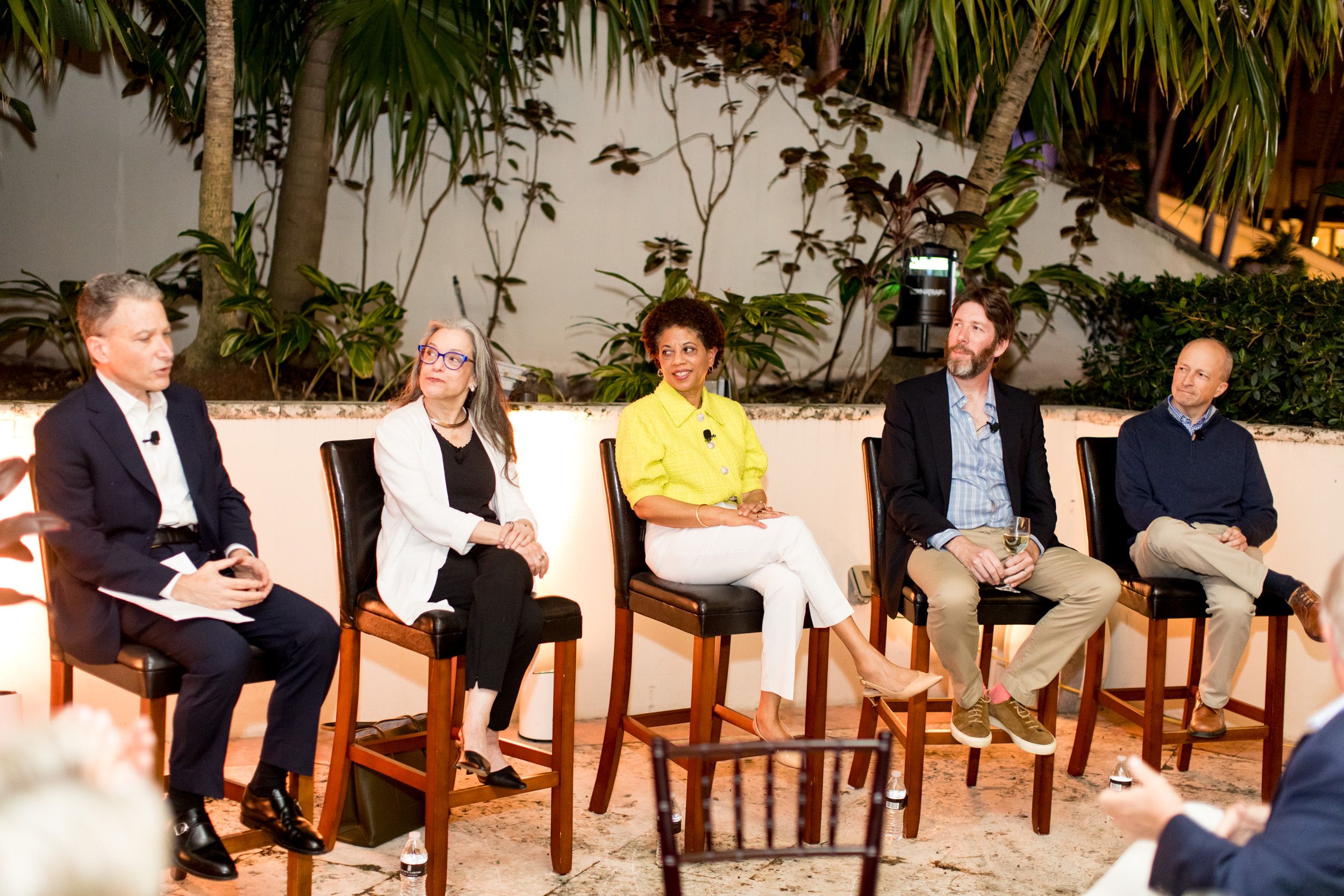
Seize the Vote
Learn all about voting rights throughout history in this online game.
Separation of Powers
This lesson shows students firsthand how the three branches of government work together through separation of powers and checks and balances.
Thank-A-Vet Postcards
Honor veterans for supporting and defending the Constitution and protecting our freedom by thanking them with a special postcard.
The Constitution of the United States: En Espanol
Full text of the U.S. Constitution translated into Spanish.
The Constitution of the United States: Fast Facts
Ten essential facts about the U.S. Constitution.
The Constitution of the United States: First Public Printing
The first public printing of the Constitution was printed on September 19, 1787.
The Constitution of the United States: Full Text
Read the full text of the U.S. Constitution.
The Constitution of the United States: Original Image
An image of the original handwritten, signed U.S. Constitution.
The Constitution of the United States: PDF
The Constitution of the United States as a printable PDF file.
The Constitution of the United States: PDF Translations
Full text of the U.S. Constitution translated into Arabic, French, German, Italian, Japanese, Korean, Portuguese, Russian, and Simplified Chinese.
THE DECLARATION, THE CONSTITUTION, AND THE BILL OF RIGHTS
This lesson builds student understanding of the relationships between the United States’ founding documents by comparing and contrasting the Declaration of Independence, the U.S. Constitution, and the Bill of Rights.
The Drafting Table
Which documents and ideas influenced the Founders when drafting the Bill of Rights? How did the amendments change throughout the drafting process? What text made it into the final ratified text?
The Federalist Papers
A series of newspaper articles drafted by Alexander Hamilton, John Jay, and James Madison, urging ratification of the new Constitution.
The Founders’ Library: Thinking as a Founding Father
Students will examine the ideas that the Founding Fathers brought to the Constitutional Convention of 1787, and use them to analyze the Constitution and Bill of Rights.
The History of Flag Day
This lesson encourages students to take a closer look at the American flag and its meaning.
The History of Memorial Day
This lesson takes a closer look at the history of Memorial Day by examining World War I, World War II, and the Vietnam War and their connections to this civic holiday.
The Presidency and Tariffs
In March 2025, President Trump imposed sweeping tariffs on Mexico, Canada, and China. At the beginning of April, he imposed and then mostly reversed across-the-board tariffs on all foreign countries. The tariffs against China, which remain in place, are now being challenged in federal court.
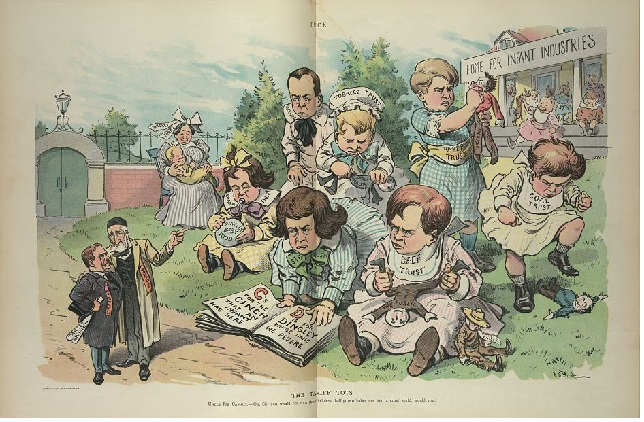
The Reconstruction Amendments
These three constitutional amendments abolished slavery and guaranteed equal protection of the laws and the right to vote.
The State of the Union Address
Can Congress delay the Presidents’ State of the Union address?
To Sign or Not to Sign: The Ultimate Constitution Day Lesson Plan
On Constitution Day, students will examine the role of the people in shaping the U.S. Constitution.
Uncle Sam Hats
Celebrate freedom by making your own Uncle Sam hat.
Venezuela and the War Powers Resolution
Does the War Powers Resolution apply to military actions taken in Venezuela?
Virginia Declaration of Rights
Drafted by George Mason, this declaration of rights later became a model for other state constitutions and the Bill of Rights.
War Making: Executive and Legislative Powers
In this lesson, students will examine the constitutional, legal, political, and historical sources of the continuing debate over war powers.
We the School
We the School is an innovative new form of student government created at Constitution High School in Philadelphia.
What Can I Say in School? An Examination of Students’ Freedom of Speech
Students will investigate the legal language defining their freedom of speech rights
Which Founder Are You?
Take this quiz to discover which Founder you're most like!

Writing Rights
Which documents and ideas influenced the Founders? How did the Founders write the Bill of Rights? Explore key historical documents that inspired the Founders during their drafting process as well as the drafts and proposals for each amendment. Follow the twists and turns as the Founders deliberated and, sometimes, disagreed, on their path to the final text. See what “could have been” had the Founders followed a different path.







